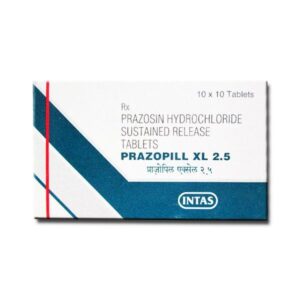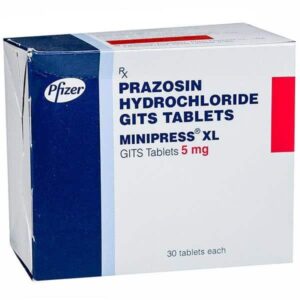PRAZOSIN
PRAZOSIN: Prazosin is a medication that belongs to a class of drugs known as alpha-1 adrenergic blockers. It is primarily used for the treatment of high blood pressure (hypertension) and benign prostatic hyperplasia (BPH), which is an enlargement of the prostate gland in men. Additionally, it can be prescribed off-label for the treatment of nightmares and symptoms of post-traumatic stress disorder (PTSD).
The mechanism of action of prazosin involves blocking the alpha-1 adrenergic receptors, which are found on the smooth muscle cells of blood vessels and the prostate gland. By blocking these receptors, prazosin causes relaxation of the smooth muscle, leading to dilation of blood vessels and improved blood flow. This results in a decrease in blood pressure and relief of urinary symptoms associated with BPH.
Prazosin is available in tablet form and is taken orally. The starting dose for high blood pressure is usually 1 mg, taken 2-3 times per day. Dosage may be gradually increased by the healthcare provider based on individual response and tolerability, up to a maximum daily dose of 20 mg. For BPH, the recommended starting dose is 1-2 mg per day, taken at bedtime. Again, the dose may be adjusted by the doctor if necessary.
Like any medication, prazosin can potentially cause side effects. Common side effects include dizziness, headache, drowsiness, weakness, and fluid retention leading to ankle or foot swelling. These side effects may be more pronounced during the initial stages of treatment or in higher doses. Other less common but serious side effects may include a sudden drop in blood pressure upon standing (orthostatic hypotension), fainting, irregular heartbeat, and priapism (painful and prolonged erection). It is important to report any unusual or severe side effects to your healthcare provider promptly.
It’s worth noting that prazosin can cause a significant drop in blood pressure, especially when starting the medication or increasing the dosage. For this reason, it is essential to monitor blood pressure regularly, and it may be necessary to adjust other blood pressure medications when starting or changing the dose of prazosin.
Overall, prazosin is a medication that effectively treats high blood pressure, BPH, and certain off-label conditions. It is essential to take prazosin as prescribed, follow up with regular doctor visits, and report any concerning side effects.




